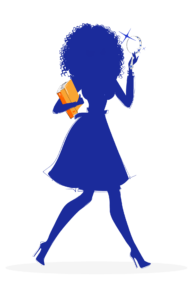by Jocquelle S. Caiby
One Saturday night when I was sixteen, I wrote a poem. It was a quick and delightful experience—the page filling quickly as I confidently tapped away on my computer, editing lines to fit the flow in my head. When I finished, I smiled, infused with excitement about how it all came together. On a whim, I decided to enter my poem in a writing contest hosted by a well-known in-print poetry magazine. A few months later, I received a letter from the magazine with a certificate for winning Editor’s Choice Award, and an invitation to attend the award ceremony in Las Vegas. I was ecstatic! Though I wasn’t the Grand Prize winner, I felt quite accomplished.
My life continued as usual, though—attending classes, shucking chores, smothering my cat, and writing more poetry—but there was one major difference: writing was no longer fun. I would write one line; scrutinize said line for twenty minutes; edit it; write a couple more lines; edit the first line again; write another line; painstakingly mull over those four lines; procrastinate; edit line three; continue this process until I had a migraine and give up on the project entirely. Fun? Not really.
The day I received that letter, my perception of “personal” writing shifted. For me, writing used to be the very definition of personal, a reprieve from the demands of being a socially adept teenager—which I wasn’t—and an outlet for everything I wasn’t comfortable expressing aloud. My writing was for myself and my enjoyment, and if it pleased others, great! But the receipt of that award changed my perception. A standard had been set, turning my “personal” writing into “public” writing. Instead of writing for self-expression, I wrote for validation. From then on, writing—period—made up some of the most anxious moments of my life. I stressed over the general and the specific: Did I utilize a diverse vocabulary? Did I sound intellectual or emotionally resonant? I obsessed over these questions. Soon after, I developed physical symptoms. My heart rate quickened, my temperature rose, and I had migraines. It was the definition of extreme discomfort—of anxiety. And so, I stopped writing for years.
I considered the underlying causes for my problem. Everyone wants to be a writer. In such a congested field, the pressure to stand out is tremendous. We believe we live in a meritocracy where you’re only as good as your last accomplishment, and your ability to do a job is determined by how much more you’ve accomplished than others. When I realized “accomplishing” was a thing I could do, the pressure became real: “If I want to be a writer I need more of these ‘accomplishments.’”
In 2012, Maura Kelly wrote an article for The Atlantic entitled Trickle-Down Distress: How America’s Meritocracy Drives Our National Anxiety Epidemic. In the article, Maura discusses how Americans’ belief that we live in a meritocratic society has led us to stress over success, earning us the largest percentage of anxiety afflicted citizens of any country.
Working in the publishing industry, I’ve seen firsthand how important credentials are. Editors and agents both covet writers with MFAs, bylines in well-known publications, a stellar publishing history, and lots of connections. With this in mind, how could I not be anxious about writing? However, I’ve also learned that passion and authenticity mean just as much in this industry. During my writing hiatus, I read a lot—blogs, articles, and books. At first, it just made me jealous. But then, I fell in love with what I read. I realized the most beautiful thing about writing is the unbridled honesty and fearless creativity instilled in each word. These things only exist when a writer creates from a place of trust, in their ability and in themselves.
So I began writing again, but this time with trust. The anxiety comes and goes, but it’s much more enjoyable. And trust doesn’t mean closing the door on self-editing or constructive criticism. It means letting your piece flow, learning what works and what doesn’t, and being open enough to strongly consider suggestions from those who may know a little more. Even the best writers make mistakes or need assistance. As an agent, I often hear words like “raw,” “truthful,” “authentic,” and “passionate” as descriptors of amazing writing. And in the end, the writing is what we do this for. If writing is your goal, don’t let the pressure get to you. Remember to trust yourself, but, most importantly, enjoy yourself.



